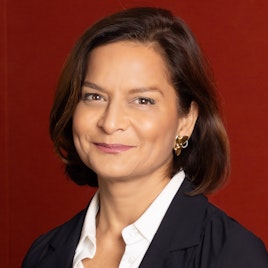Reimagining American Democracy
By Laleh Ispahani

Inside Open Society is a look at the leaders at the Open Society Foundations who are advancing our vision to address the world’s most urgent threats to democracy and human rights at a transformative scale.
I was 12 years old when I woke up to learn that Pakistan’s democratically elected prime minister, Zulfikar Ali Bhutto, had been hung by the army. That same year, I moved with my mother to London at a time when race riots had erupted across Britain’s major cities. I could see and feel the racial tensions that had escalated between the white and rapidly growing South Asian communities as I rode the No. 14 bus each day to and from school.
While I now call the United States home, the sometimes-harsh realities of my upbringing in Bangladesh, Pakistan, and Iran exposed me to war, revolution, and martial law. These early experiences gave me a visceral understanding of how fragile governments can be, how quickly they can fall apart, and what that means for the already marginalized.
These experiences have driven me to dedicate my energies to supporting the development of strong, vibrant, and democratic societies, ones that prioritize the needs of the most vulnerable. At Open Society, I lead our U.S. work, focusing on reimagining and reinventing American democracy, so that it is rooted in equity, and guarantees access for those who have traditionally been excluded from it.
Today, U.S. democracy is under severe strain. It's being tested by extremists and authoritarians who seek to undermine our system of government by questioning the integrity of elections and spreading misinformation and disinformation. We’ve also seen an upswing in lobbying for laws that decimate long-held and basic freedoms and rights: from the ability to access reproductive health care to censoring what books are read and circumscribing what history can be taught in schools.
These stressors are symptoms of something that runs far deeper in U.S. history. Post-Civil War, after the institution of slavery was dismantled, we might have built a new democracy. But the white majority rigged the rules, used propaganda, and deployed all means necessary to reclaim lost power, including the murder, terrorizing, and incarceration of newly freed Black Americans. That history continues to reverberate today, for Black Americans and others too, including indigenous communities and many immigrants.
An accurate reading of our history—not just America’s, but human history—suggests that we would be misguided to think of our challenge as the need to repair democracy; rather, we need to reinvent it. A democratic breakthrough will require not more white papers or better polling data, but empowering the people who will fight for the America that has not yet been and yet shall be.
Voting rights, for example, are being eroded in the U.S. in many ways—including through Supreme Court rulings and state-level measures which have restricted voting rights, disproportionately impacting voters of color; limiting workers’ ability to organize; and radically redrawing legislative district maps to bolster one-party rule.
Exacerbating challenges to free and fair elections has been the decline of public interest media. This vacuum has created space for social media companies which are bound by far fewer rules than traditional media—giving anti-democratic voices easy access to large audiences. Finally, division in America is deep and spiraling.
Nevertheless, I’m hopeful. Youth voters are helping us get through partisan gridlock and a fractured politics because they have a very distinct view of the world they want. It’s not a red or blue world, an ideologically fixed or politically polarized world—or one that is merely “tolerant” of differences. It’s a green world, a welcoming world, a world of possibility. Together with the faith communities, veterans’ groups, and other civic organizations, these young people who don’t want to inherit a fractious and unstable future will help us bridge political divides in meaningful ways.
Over the next five years, the Open Society Foundations’ work in the U.S. will seek to repel the most serious challenges to democracy, which will necessitate a civic space including a full array of organizations working to create a more inclusive society, whether it be advocating for reproductive rights and justice, immigrants’ rights, or disability rights.
More specifically, we will focus on:
- Investing to create a durable multiracial, pro-democracy majority in America, while increasing the civic and political engagement of underserved and underrepresented communities
- Supporting critical response infrastructure to prepare for and combat political violence and threats, foreign and domestic, to our elections systems
- Ensuring that those who attack our democracy are held accountable for efforts to undermine elections, intimidate voters, or silence legitimate dissent
- Supporting litigation and advocacy initiatives that support and expand voting rights in the states, and that hold or expand access to reproductive health services
This work will us put us further along on the path to a multiracial, multiethnic, vibrant, and democratic society—the North Star of Open Society-U.S.

Laleh Ispahani is managing director of Programs at the Open Society Foundations.